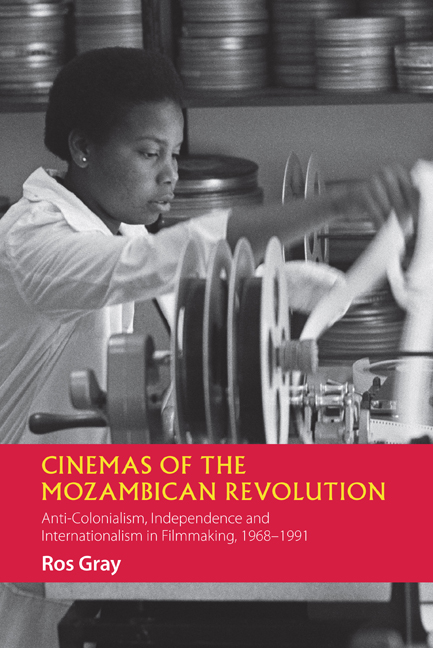 Cinemas of the Mozambican Revolution
Cinemas of the Mozambican Revolution Book contents
- Frontmatter
- Contents
- List of Images
- Acknowledgements
- Glossary
- Abbreviations
- Map of Mozambique
- Introduction
- 1 We Will Win! Filming the Armed Struggle in Mozambique, 1968–1973
- 2 From the Rovuma to the Maputo: Confluences of Independence, 1974–1975
- 3 Birth (of the Image) of a Nation: Delivering Cinema to the People, 1976–1978
- 4 Who Exactly is the Party? Didacticism, the Battle of Information and the Vanguard Party, 1977–1979
- 5 A New Symphony: Cinema and Television in the ‘Decade of Development’, 1980–1984
- 6 Let Them Come! Filmmaking on the Frontline against Apartheid, 1980–1989
- 7 The Time of the Leopards: The End of Socialist Fictions and the Beginnings of the Docu-Drama, 1985–1991
- Conclusion
- Bibliography
- Filmography
- Index
4 - Who Exactly is the Party? Didacticism, the Battle of Information and the Vanguard Party, 1977–1979
Published online by Cambridge University Press: 16 July 2020
- Frontmatter
- Contents
- List of Images
- Acknowledgements
- Glossary
- Abbreviations
- Map of Mozambique
- Introduction
- 1 We Will Win! Filming the Armed Struggle in Mozambique, 1968–1973
- 2 From the Rovuma to the Maputo: Confluences of Independence, 1974–1975
- 3 Birth (of the Image) of a Nation: Delivering Cinema to the People, 1976–1978
- 4 Who Exactly is the Party? Didacticism, the Battle of Information and the Vanguard Party, 1977–1979
- 5 A New Symphony: Cinema and Television in the ‘Decade of Development’, 1980–1984
- 6 Let Them Come! Filmmaking on the Frontline against Apartheid, 1980–1989
- 7 The Time of the Leopards: The End of Socialist Fictions and the Beginnings of the Docu-Drama, 1985–1991
- Conclusion
- Bibliography
- Filmography
- Index
Summary
By 1977, the INC was functioning as an institute in command of acquisition and distribution, the profits from which were channelled into the production of films made by a team that included young people who would have been cut off from the possibility of becoming filmmakers under colonialism. The equipment purchased by Ron and Ophera Hallis had made it possible to shoot films on the cheaper format of 16mm that could then be transferred to 35mm for projection in the cinemas. Taking cinema to ‘the people’ and collectivising production involved not only building up the INC's institutional capacity but also dismantling the hierarchies that had structured the colonial film production. Chapter 3 examined how a number of filmmakers explored the emancipatory potential of capturing scenes of everyday life on film. However, such projects played a minor part in comparison with the bulk of the INC's productions, which sought to harness cinema to the work of political education and the dissemination of information.
This chapter addresses the didactic purpose of many of the INC's film productions, the role that cinema was understood to play in the ‘battle of information’, and the ways in which films made during these years address their audiences as learners. The battle of information referred in part to the effort to keep Mozambicans informed about the radical changes taking place across the country, explaining the reasons for the challenges they faced and the ways Frelimo intended to address problems of supplies and logistical difficulties in the face of natural disasters and the ruination of infrastructure caused by the colonial war and acts of sabotage by departing Portuguese. In 1977, Frelimo announced that it was transforming into a vanguard Marxist–Leninist party, aligning itself more closely with the Soviet Union and the Eastern Bloc. The dissemination of information to Mozambicans thus also involved instruction on how to participate in the revolution that was unfolding in the correct way. This chapter analyses how short documentaries and the first version of the Kuxa Kanema newsreel that was produced in 1978 and 1979 answered to this demand, exploring the extent to which forms of cinema pedagogy may be understood as anticipatory rather than necessarily authoritarian. The battle of information also involved the crucial work that film could perform in challenging the narratives about the region that were circulated by the white minority regimes in Rhodesia and South Africa.
- Type
- Chapter
- Information
- Cinemas of the Mozambican RevolutionAnti-Colonialism, Independence and Internationalism in Filmmaking, 1968–1991, pp. 149 - 180Publisher: Boydell & BrewerPrint publication year: 2020


